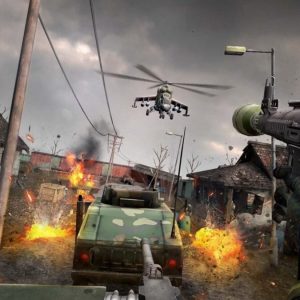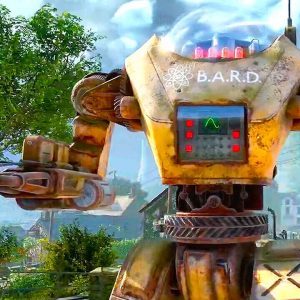“Actual happiness not guaranteed.”
When I first saw the reveal trailer for Paranoia: Happiness is Mandatory, I made the assumption that it was some sort of management simulator, similar to Prison Architect or a comedic version of Observation. Thankfully, I was incredibly wrong.
Unaware that developer Black Shamrock had secured the rights to the tabletop RPG of the same name, I was excited to learn that Paranoia: Happiness is Mandatory is a compelling mix of classic isometric RPGs and tactical combat sims set in a hilariously absurd Orwellian nightmare.
The world of Paranoia is a far-future automated habitat known as Alpha Complex, where everyone is Happy™. Happiness™, in this scenario, means thoroughly medicated and pacified by the various agents of the very good and kind, and definitely not-at-all evil supreme overlord of your little world, Friend Computer.
Friend Computer keeps the citizens of Alpha Complex Happy™ in a variety of ways, beyond just their perscribed Happy Pills. Friend computer keeps its citizens clean. Friend Computer provides its citizen with purpose, giving them important jobs that keep them Happy™, like cleaning the cleaning robots, or researching new flavors of Classic-flavored Fizzy Beverage. Friend Computer keeps its citizens Happy™ by keeping them safe. Happiness is following the Rules™, like “remain within your color-coded security clearance area” or “refrain from independent thought to avoid being placed on additional watchlists.”
Friend Computer is everywhere. Almost. And that’s where you come in.
“
It wouldn’t be called “Paranoia” without good reason.
You take on the role of a Troubleshooter: someone whose job is to deal with any problems in Alpha Complex that may require a more personal touch than Friend Computers many drones and servo-arms are able to provide. In our demo, this meant investigating why one of the maintenance bots in a sub-basement level was behaving oddly.
It turned out that a group of Traitors – the designation given to anyone in the Alpha Complex facility that does not follow the rules or remain Happy™ – had sealed off a few rooms in the sub-basement to use as their personal LARP-ing grounds (they’d even reprogrammed security bots to shout “Lightning Bolt!” as they fire their lasers), and it was up to us and our three crew members to clear them out.
Combat in Paranoia is real-time, but you can pause the action whenever you like for as long as you want to give your squad of four commands, sending them to cover, attacking specific enemies or making use of their unique specializations. For example, while your Cleanliness Officer might be able to use disinfecting chemical to deal acid damage, or your Happiness Officer (basically the logical and horrifying extrapolation of Big Pharma and Social Media) could buff your team with psychotropic drugs.
What’s interesting is that rather than failing and restarting a mission upon death with a different skill loadout, HiM features a unique take on permadeath. Friend Computer understands that accidents happen, and as such has issued Troubleshooters with a bank of clones that are activated upon a unit’s accidental termination (or an intentional one, depending on your actions). What’s interesting is that each time you activate a clone, you’re able to re-spec your skills and attribute points, effectively creating a new character every time you die. Friend Computer only provides six clones that can be re-spec’d, though, so you’ll have to choose wisely if you don’t want to get stuck with a skill set you don’t want. I’m told, however, that there may be a certain geneticist somewhere in Alpha Complex that could help with that – if you’ve got funds and are willing to risk the demerits…
Of course, it wouldn’t be called “Paranoia” without good reason. While your team members may be under your control during combat and missions, they are very much not your team members. Even though your jobs will take you into areas where Friend Computer’s scanners don’t work, that doesn’t mean your team members won’t inform Friend Computer of any misdeeds you commit while on a mission. For example, when we found ourselves at a locked door, our tech expert suggested that I hack a nearby vending machine to gain access to the local network and unlock the door. It was a good idea, so I did – and the little weasel ratted me out as soon as we got back upstairs, which caused my Treason Level (a percent rating system that every citizen has indicating how concerned Friend Computer is with their Happiness™) to increase and change my citizen rating from Questionable to Suspicious.
We didn’t see much of Alpha Complex beyond the couple of floors we visited, but the little bit of the world it showed us did a great job playing with this notion of omnipotence and mistrust, and how you have to deal with it. Wherever your character goes, security cameras track your every move – even the Friend Computer icon at the top of the screen (it lets you know when you’re in view of its cameras) follows the motion of your mouse cursor with eerie, silent malice.
Though I only experienced a small portion Paranoia’s world, I was immediately hooked by its witty take on the “robots gone awry” genre, and can’t wait to see how my exploits play out depending on my choices. Will I splinter off from the other citizens to join a secret society and overthrow FC? Or will I remain a steadfast and Happy™ agent of Friend Computer’s ruthlessly intelligent design? Happiness may be mandatory, but participation is entirely voluntary – and I’ll gladly be throwing on my read overalls later this year.
JR is IGN’s Senior Features Editor. You can follow him on Twitter @USofJR
























